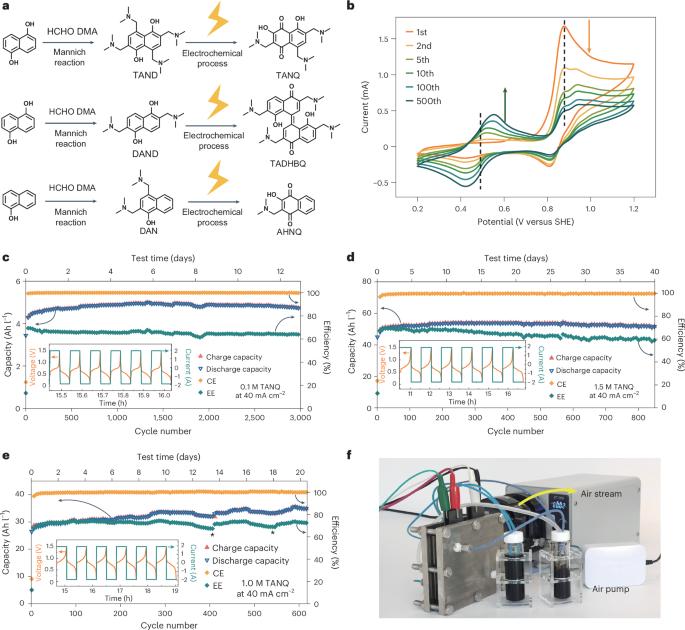Air-stable naphthalene derivative-based electrolytes for sustainable aqueous flow batteries
IF 25.7
1区 环境科学与生态学
Q1 ENVIRONMENTAL SCIENCES
引用次数: 0
Abstract
The growing global capacity for renewable energy generation necessitates the deployment of energy storage technologies with a combination of low cost, good performance and scalability. With these advantages, aqueous organic flow batteries have the potential to be the system of choice because they could store energy from organic redox-active molecules. Here we report naphthalene derivatives as organic redox-active molecules that exhibit high solubility (~1.5 M) and a stable redox-active framework with no obvious capacity decay over 40 days (50 Ah l−1) in an air atmosphere in flow batteries. We report a battery that runs smoothly even under continuous airflow without obvious capacity decay for ~22 days (more than 600 cycles). A series of spectral analyses and theoretical calculations reveal that the dimethylamine scaffolds improve the water solubility and protect the active centre, ensuring the stability of the molecules during the charge and discharge process. Owing to the success in kilogramme-scale molecular synthesis, pilot-scale stack expansion with notable cycling stability over 270 cycles (~27 days) is attained. The cost benefit evidenced by technoeconomic analysis together with the stability even under open-air conditions indicates the practical value of the present molecular system in grid-scale energy storage. Redox flow batteries are solutions to cost-effective grid-scale energy storage. Here the authors report air-stable naphthalene-based redox-active molecules for scaled-up aqueous flow batteries.

基于空气稳定萘衍生物的可持续水流电池电解质
随着全球可再生能源发电能力的不断增长,有必要部署兼具低成本、高性能和可扩展性的储能技术。凭借这些优势,水性有机液流电池有望成为首选系统,因为它们可以通过有机氧化还原活性分子储存能量。在这里,我们报告了作为有机氧化还原活性分子的萘衍生物,它们在液流电池中的空气环境中表现出高溶解度(~1.5 M)和稳定的氧化还原活性框架,在 40 天(50 Ah l-1)内没有明显的容量衰减。我们报告了一种电池,即使在连续气流条件下也能平稳运行 22 天(超过 600 次循环),且无明显容量衰减。一系列光谱分析和理论计算显示,二甲胺支架提高了水溶性并保护了活性中心,确保了分子在充放电过程中的稳定性。由于在公斤级分子合成方面取得了成功,中试规模的堆栈扩展已达到显著的循环稳定性,超过 270 个循环(约 27 天)。技术经济分析所证明的成本效益,以及即使在露天条件下的稳定性,表明了本分子系统在电网规模储能方面的实用价值。氧化还原液流电池是具有成本效益的电网级储能解决方案。作者在此报告了用于放大水流电池的空气稳定萘基氧化还原活性分子。
本文章由计算机程序翻译,如有差异,请以英文原文为准。
求助全文
约1分钟内获得全文
求助全文
来源期刊

Nature Sustainability
Energy-Renewable Energy, Sustainability and the Environment
CiteScore
41.90
自引率
1.10%
发文量
159
期刊介绍:
Nature Sustainability aims to facilitate cross-disciplinary dialogues and bring together research fields that contribute to understanding how we organize our lives in a finite world and the impacts of our actions.
Nature Sustainability will not only publish fundamental research but also significant investigations into policies and solutions for ensuring human well-being now and in the future.Its ultimate goal is to address the greatest challenges of our time.
文献相关原料
公司名称
产品信息
阿拉丁
1,5-dihydroxynaphthalene
阿拉丁
1-naphthol
阿拉丁
dimethylamine solution
阿拉丁
formaldehyde solution
 求助内容:
求助内容: 应助结果提醒方式:
应助结果提醒方式:


